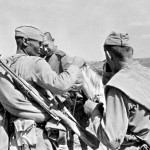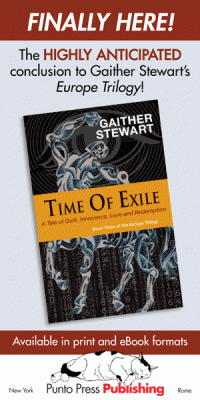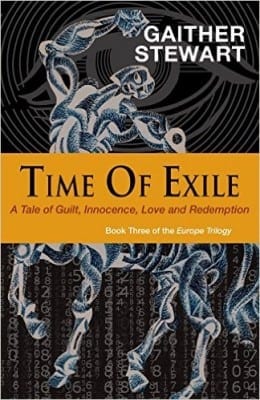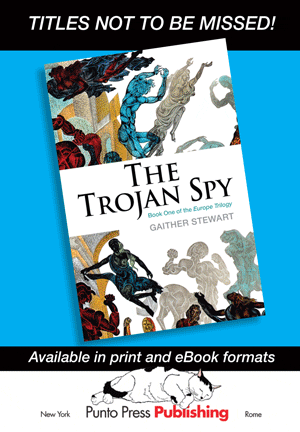
Kendall Mercer
PREFATORY NOTE
IN DEFENSE OF THE POLITICAL NOVEL
TIME OF EXILE, the third volume of Gaither Stewart’s Europe Trilogy, is a political novel. I see no reasons to conceal it or to feel shame. On the contrary.
Are the novels of Gabriel Garcia Marquez or Miguel Angel Asturias not political? And worthy of the Nobel Prize.
Of course one may say that those are not Anglo-American literature, but Latin American. Still, as if the novels of Graham Greene were not political. As if Hemingway’s best novels were not political. As if The Grapes of Wrath, All the Kings Men, and Catch-22 were not political novels.
 Only fools and cowards can turn up their noses at the political novel in today’s world in which neo-liberals have created a huge economic crisis, in a world in which NATO blatantly organizes one aggression after another—against Yugoslavia, against Iraq, against Afghanistan, against Libya, against Cote d’Ivoire—overthrows disagreeable governments and installs in their place marionettes. That is, in a world governed by rotten politics.
Only fools and cowards can turn up their noses at the political novel in today’s world in which neo-liberals have created a huge economic crisis, in a world in which NATO blatantly organizes one aggression after another—against Yugoslavia, against Iraq, against Afghanistan, against Libya, against Cote d’Ivoire—overthrows disagreeable governments and installs in their place marionettes. That is, in a world governed by rotten politics.
It is stupid to turn up one’s nose at political novels today when works like Fifty Shades of Grey are foisted on you as the only alternative political prose.
You will not read intellectual-political prose but you read Shades of Grey. Then you unlearn how to read. Then how to think. You unlearn how to speak. You begin to bellow. You become part of the herd. And the same persons who organized the world economic crisis and aggression against Yugoslavia and Libya with a crack of the whip will drive you to the slaughter-house. They will make of you a cheap sausage of Fifty Shades of Grey.
—ALEKSANDR TARASOV
Writer, Sociologist, Historian, Literary Critic
 Time of Exile
Time of Exile
A novel
(Volume 3 of Europe Trilogy)
By Gaither Stewart
Punto Press/ Trepper & Katz (2015)
374 pp
It has been said that history develops, while art stands still. That is to say, the recorded in some fashion or the other, true or falsified, world events, earth-shaking events, take place at a breath-taking pace around all of us. Meanwhile real art proceeds at its own pace, patient and observant, with one eye on the past and the present, the other peering toward the future. Novelists of yesterday and today deal with many historical events but all of them deal with those events differently than does the historian. The creative mind of the novelist will always see something different from that which the historian or the political reporter sees.
One says art stands still in the sense that certain aspects of the novel tend to remain the same in all ages, even though each artist will emphasize specific aspects in his own original way. In a series of lectures at Trinity College, Cambridge, in 1927, the distinguished English writer, E.M. Forster, listed what he considered the fundamental aspects of the novel: the story itself, the people, the plot, the fantasy of the writer and his prophetic vision, the pattern and rhythm of the writing style.
I considered these facets of the novel in my read of Gaither Stewart’s new novel, Time of Exile, the concluding volume in his Europe Trilogy, all three published by Punto Press, and concluded that the author had in fact dealt in close detail with each feature of the novel. The story itself is fascinating and reflects reality, his fantasy leaps from each page, his invention of the now renowned Edward Snowden before the appearance of Snowden himself is prophetic, and the story’s rhythm changes from line to line giving the novel its page-turner quality.
However, as the literary reviewer I would add aspects that will not pass unnoticed by the alert reader. When dealing with the “people”, i.e. with his the broad and variegated cast of characters, the author does not simply create one or two well-rounded, multi-dimensional characters surrounded by a variety of flat one-dimensional characters. Instead, with rare exceptions each character, major or minor, are complex personalities engaged in the same interior monologue as the story’s major character, Elmer Redway, the young communications genius who deserts from the U.S. Army in East Europe and reveals to the world the nefarious activities of his nation’s leaders.
Although this is a story of dangerous adventure and fiery romantic love, which takes the reader to exotic locations across the face of Europe from Bulgaria, to Belgrade in Serbia, to Rome, to Istanbul and finally Berlin, Time of Exile is also a political story: the political awakening of Elmer, the 19-year old genius who leaves MIT and joins the army to see the world. His political education begins there.
A first lesson from his political mentor in Belgrade sets the tone of the political background for the entire novel:
“Elmer,” Mirko used to say, “your intercepts depict a nation gone mad. What else can you call a bully nation that threatens, blackmails, spies, kills and makes war of pure aggression? Were it not the lone superpower it would be considered a rogue state. It’s a sick nation, Elmer. Your America.”
“My America?” Elmer had protested.
“A sick people too. If they were half sane they would stop their government. If they want to, people can change things. Or they can choose to ignore laws and morality. If it wants to, America can see itself in a mirror. Just take a look. But from you they can learn what their diplomats and military are really doing and saying around the world. About their crimes. Elmer, they’re sick ….”
“An ignorant people, insane for war …. Record military budgets. Record arms sales. As if torture and murder and war crimes were insignificant! …”
“‘Now you personally have to pay for your gift to the media and to mankind which they instead call treason. Your life is on the line, Elmer. You’re on the run. You, the real patriot, a hero of our times.”
The characters of Time of Exile are permeated with a desire to do the world some good, a quote from John Keats whose grave together with that of Percy Shelley are in Rome’s Poets’ Cemetery novel where much of the novel’s action takes place. Elmer said he loved living near the two poets and on a street named Via Caio Cestio, with a pyramid around the corner, the pinnacle of which he can see from his living room.
I will conclude this glimpse at the riveting story of Time of Exile with an abbreviated version o the touching conversation between two professional bodyguards trained to kill who are standing in a crowded cemetery in Belgrade where the funeral of the man they were to kill but didn’t is taking place. Their talk digs into the very heart of the matter of good and evil that man faces in life.
The bugle fell silent. A barely perceptible human reflux began, floating through the mist, swaying slowly down the hill and toward them, a rhythmic mass motion, slowing, drifting over the gravel, and then deviating toward the two statuesque figures conversing intently in the center of the aleja of the New Cemetery.
“You know that Dostoevsky and Freud are my secret teachers, Roberto says. “Both describe as eternal the battle of your mind seesawing between reason and conscience and your psyche, your inner soul … or maybe your spirit. Maybe it’s the true self you’re searching for. I know you read the book I gave you in the jeep that day in Galata. Remember Nikolay, a minor character in Crime and Punishment? He feels guilt out of all proportion to his minor crime of the theft of a necklace. Because of his guilt-ridden consciousness he seems to seek a major crime of which to be guilty, one that will make of him a real criminal.”
“Yeah, I didn’t understand why he confesses to a crime he didn’t commit.”
“For him, guilt for a major crime is more tolerable than the intense pressure of the sort of abstract sinfulness arising from his subconscious. That’s why he confesses to a murder he had nothing to do with. And that same intense feeling of sinfulness in the real murderer’s subconscious brings about Raskolnikov’s confession that he killed the greedy moneylender. Guilt is the point. It takes a lot of courage and also sometimes skill—like ours, by the way—to kill a fellow human being. Now, in today’s now, you feel guilt for our potential crime, which, as it happens, we didn’t commit. So it’s not exactly the same thing as Raskolnikov’s quandary.”
“Still, I feel that something out of the ordinary has happened,” Gianluca confessed. “Is that guilt I feel? I suppose that’s the right word. We were one step away from the moment of truth … the decision to kill or not to kill. Doesn’t our uncertain intention count against us even though someone else did it in our place? In any case it seems instinct is in command everywhere. Is that right?”
“History shows us over and over that human instincts command too often. In the long run, at least. Reason tries to limit the damage caused by our worst instincts but over time reason loses ground. Look what happened here in Belgrade. They killed a man because of his reason.”
Gianluca sighed. “I obviously don’t know myself and if I don’t know myself, then others can’t even begin to know the real me. Not you. Certainly not Serena. I’ve felt lonely all my life … because no one knows me.”
“That’s normal, Luca,” Roberto said gently, placing a hand on his friend’s arm as if to reassure him that he was not alone. “That’s the reason for all the incommunicability in the world. The isolation in which each of us lives. Then, few people take the time for self-examination. We’re all too busy showing off superficial facets of our selves.”
“That describes me in a way. Divided into many different pieces.”
“Still, Luca, if your mind could penetrate your unconscious—drill down to the core to the real you—in order to understand your instincts, you would become one whole person. That’s what psychology is all about.”
“You mean my mind and my unconscious would become one?”
“At least to the degree that reason would command you, not your instincts. Instead, you and I haven’t seen that happen anywhere. In our world men are still like wild beasts. Ours is a world in which instinct commands. Instinct, independent of reason. Not the same instincts as eating and sex, but instincts to dominate … and sometimes to kill. That same conflict between reason and instinct goes on throughout the whole human race. Still, since the murder of Kasun hasn’t killed his idea of a Serbia outside NATO, a certain morality survives.”
“Do you really think so?” Gianluca muttered
The crowd had thinned out and vanished through the great gate and out into the misty noon in the city. Sunrays touched the gravel pathways here and there. Roberto touched Gianluca’s arm again and nodded toward the now sun-soaked sloping hill on the opposite side of the walkway. A small herd of sheep moved over the crest of the hill followed by two lambs trying to keep up. “The innocent ones,” Gianluca said, the image of his mother and the ‘innocent lamb’ about which she sometimes spoke vivid in his memory.
Roberto let his hand rest on his friend’s arm.
“If I can’t ask her then I would like to confess to a priest … and ask for forgiveness.”
“For absolution, you mean,” Roberto murmured. “But from a priest who is no less guilty than you? If you list all the good and the evil the priest does, he too comes out guilty.”
“Roberto! Then what you’re saying is that everybody is guilty. Even my mother! And Serena too. That’s terrible, Roberto. Terrible. Then there’s no one to absolve us … for our presence here?”
Roberto sighed.
“That’s the way it is in life, Luca. A seesawing back and forth between regret for our acts and hope for forgiveness … and somehow, someday, redemption.”
Kendall Mercer is a veteran reader of political thrillers. He has read all of Graham Greene’s, John le Carré’s, and Gaither Stewart’s books. He now regards the latter as superior to the other two, given his novels didacticism. Mercer lives in Whidbey Island, WA.
![]()


